Keir Starmer refused to rule out a huge stealth tax raid today – as Rachel Reeves grinned her way through PMQs.
The premier dodged on whether the freeze on tax thresholds will be extended as he was grilled by Kemi Badenoch in the Commons.
Despite mounting alarm about the estimated £30billion black hole in the public finances, Sir Keir said Labour‘s manifesto pledges not to increase income tax, employer national insurance or VAT still stand.
But challenged to promise that thresholds will not be held again – raising £10billion a year by dragging millions of Brits deeper into the tax system – he said: ‘We will stick to our manifesto commitments, we will stick to our fiscal rules.’
Sir Keir was flanked by the Chancellor, who was determinedly smiling after the extraordinary scenes of her breaking down in tears last week.
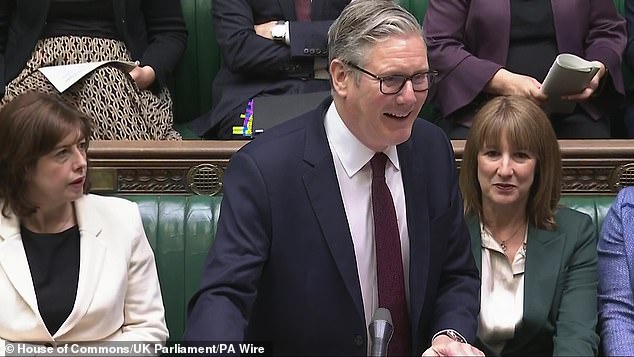
Keir Starmer dodged on whether the freeze on tax thresholds will be extended as he was grilled by Kemi Badenoch in the Commons
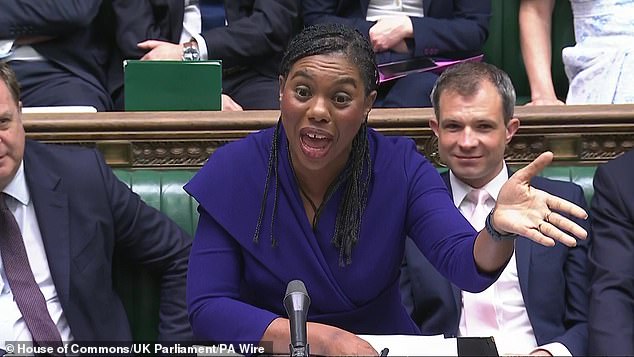
Ms Badenoch asked about the tax thresholds – and highlighted that the premier did not answer directly
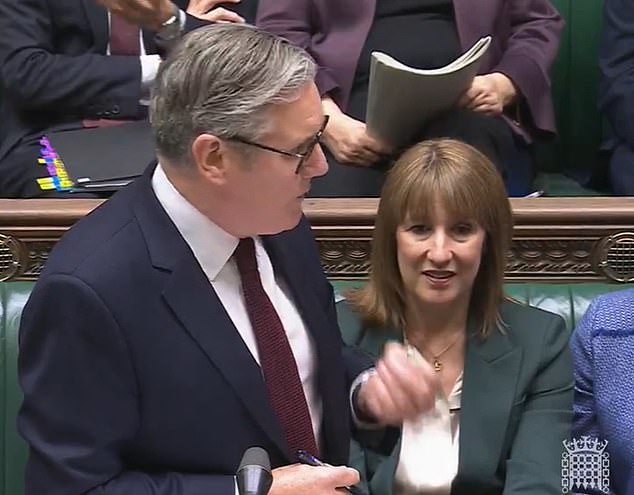
Sir Keir was flanked by the Chancellor, who was determinedly smiling after the extraordinary scenes of her breaking down in tears last week
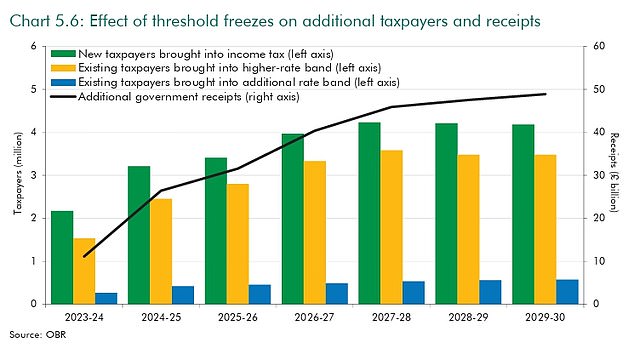
The Treasury’s OBR watchdog highlighted the impact of the tax threshold freezes in a report yesterday
The ducking and diving came as Labour’s Left heaped pressure on the PM to ramp up taxes to fund spending more splurges.
Opening hostilities, Ms Badenoch asked: ‘In their manifesto last year, Labour promised not to increase income tax, not to increase national insurance and not to increase VAT.
‘Does the Prime Minister still stand by his promises?’
Sir Keir replied: ‘Yes.’
Mrs Badenoch said: ‘It is rare that he’s able to give a clear answer but I am glad that he has done so.’
She then asked about the tax thresholds – and highlighted that the premier did not answer directly.
‘The whole house would have heard him fail to rule out freezing tax thresholds. He could say with the first question, he could promise, but he couldn’t this time round. But what does this mean, Mr Speaker? He’s talking about record investment and more jobs, we know that people are losing their jobs. Unemployment has gone up every single month since their year in office, but what does it mean on this issue of tax thresholds?
‘It means that under Labour, millions of our poorest pensioners face being dragged into income tax for the first time ever. Does the Prime Minister think it is right that struggling pensioners should face a retirement tax?’
Sir Keir Starmer said: ‘We will stick to our manifesto commitments, we will stick to our fiscal rules. This is a language they don’t understand. That’s what got us into the problem in the first place.’
The tax burden is set to hit a new high as a proportion of GDP after the last Budget imposed a £41billion increase – the biggest on record for a single package.
Ms Reeves has insisted she will not come back for another big raid, but seems to be backed into a corner after guaranteeing to keep the fiscal rules on borrowing.
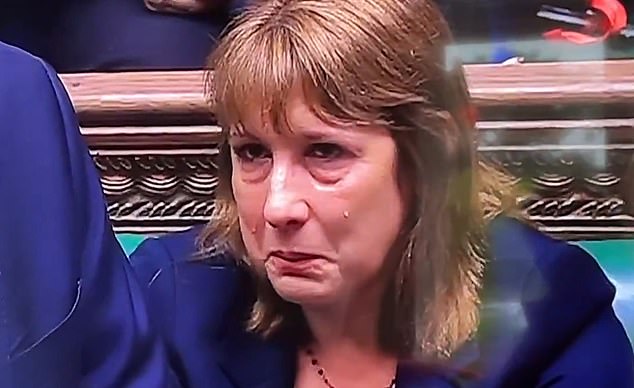
Ms Reeves’ demeanour was in marked contrast to the emotional scenes last week (pictured)
She has also said Labour will keep the manifesto pledge not to hike taxes on income tax, employee national insurance or VAT.
But experts have suggested that the stalling economy together with spending pressures could mean she has a £31billion funding gap to fill at the Autumn Budget.
The respected IFS has warned the tax increases might even need to be on a similar scale to the record £41billion hike in the burden imposed last year.
A Tory spokesman said: ‘The Prime Minister emphatically ruled out any rises in income tax, NI or VAT.
‘But he wouldn’t repeat the promise his Chancellor made in the autumn to lift the freeze on income tax thresholds.
‘He also refused to rule out a retirement tax and wealth taxes. The only reasonable conclusion is that a toxic cocktail of Labour tax rises are coming in the autumn budget.’
Senior Labour figures have been urging Ms Reeves to impose a new ‘wealth tax’.
Ministers have repeated refused to rule out the idea in recent days, despite the Chancellor previously saying she was ‘not interested’ in it.
But the Treasury watchdog warned yesterday that the government cannot rely on small numbers of ‘mobile’ rich people to fund massive spending demands.
The OBR highlighted the ‘risks’ of trying to milk too much from ‘high net worth’ individuals as it painted a grim picture of the government’s long-term finances.
The books have been left in a ‘vulnerable’ position after Covid and energy price spikes that could prevent ministers responding to future economic shocks, according to the latest fiscal sustainability report.
That has been exacerbated by U-turns on curbing disability benefits spending and the winter fuel allowance, as well as pressure to ramp up defence.
Meanwhile, the backdrop of an aging population, with state pension costs set to spike, means government debt could spiral to 270 per cent of GDP by the 2070s – or even higher in a worst-case scenario.
The triple lock on the state pension – which means it rises by the highest out of earnings, inflation or 2.5 per cent every year – is one of the factors identified as making the situation ‘unsustainable’.










